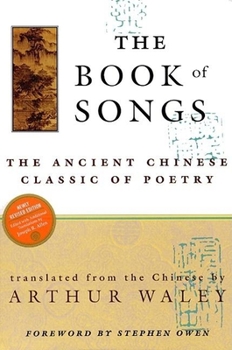The Book of Songs: The Ancient Chinese Classic of Poetry
Select Format
Select Condition 
Book Overview
One of the five Confucian classics, The Book of Songs (Shijing) is the oldest collection of poetry in world literature and the finest treasure of traditional songs left from antiquity. Where the other Confucian classics treat "outward things: deeds, moral precepts, the way the world works," as Stephen Owen tells us in his foreword, The Book of Songs is "the classic of the human heart and the human mind."
Format:Paperback
Language:English
ISBN:0802134777
ISBN13:9780802134776
Release Date:September 1996
Publisher:Grove Press
Length:400 Pages
Weight:0.90 lbs.
Dimensions:1.2" x 5.5" x 8.2"
Customer Reviews
1 rating
Excellent Introduction to a Difficult Book
Published by Thriftbooks.com User , 23 years ago
The Book of Songs (Shi Jing) is one of the seminal works of Chinese Civilization, along with the Book of Changes (Yi Jing), the Book of History (Shu Jing) and the Book of Rites (Li Chi). All four of these books were already old when Confucius flourished, and tradition states that they were edited by him into their present form.Old indeed they are, and virtually inaccessible even to those fairly proficient in Chinese. A mere knowledge of the Classical idiom is no guarantee of understanding them; The Yi Jing in its original Chinese is little more than a skein of characters strung together, each one of them generally to be understood on its own rather than as part of a sentence. The Shi Jing is a book of poetry, but it is poetry from a remote antiquity; it contains many words that occur nowhere else in Chinese literature, the poems usually don't rhyme any more (yes, Chinese poetry rhymes!) and no doubt some of the poems date back to an extremely remote shamanistic past in Chinese history. They are venerated for the moral message contained in them, and also for the spontaneity to life that they express - a quality that is prized so highly in East Asian culture. It is a taproot of East Asian thought, just as the psalms and Homer are for the West.Which makes Waley's translation all the more amazing, in that he could actually produce a work that is so absorbing and edifying. Waley was something of a genius of translation; he never visited the Far East - he claimed it would ruin his impression of it - but he translated so much of the best of Chinese and Japanese literature, and he did it so well. Some of the items he translated have never been attempted by anybody else, and while there are other translations of the Shi Jing his is far and away the best one to read. Those who are familiar with Waley's other works may find the book a disappointment, which is unfortunate. This is an extremely difficult work to translate, much harder than the Analects, to say nothing of the popular Chinese novels that Waley also did into English. The problem is bringing the material to life, and I feel that Waley did as much as could be done with it.This book was, I believe, out of print for quite a few years. I'm glad to see it's back.







